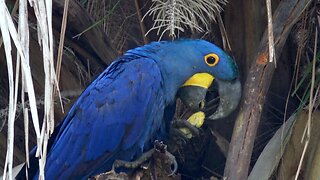Premium Only Content

Obon or just Bon is a fusion of the ancient Japanese belief in ancestral spirits and a Japanese
Obon or just Bon is a fusion of the ancient Japanese belief in ancestral spirits and a Japanese Buddhist custom to honor the spirits of one's ancestors. This Buddhist–Confucian custom has evolved into a family reunion holiday during which people return to ancestral family places and visit and clean their ancestors' graves when the spirits of ancestors are supposed to revisit the household altars. It has been celebrated in Japan for more than 500 years and traditionally includes a dance, known as Bon Odori.
The festival of Obon lasts for three days; however, its starting date varies within different regions of Japan. When the lunar calendar was changed to the Gregorian calendar at the beginning of the Meiji era, the localities in Japan responded differently, which resulted in three different times of Obon. Shichigatsu Bon (Bon in July) is based on the solar calendar and is celebrated around the 15th of July in eastern Japan (Kantō region such as Tokyo, Yokohama and the Tōhoku region), coinciding with Chūgen. Hachigatsu Bon (Bon in August), based on the lunar calendar, is celebrated around the 15th of August and is the most commonly celebrated time. Kyū Bon (Old Bon) is celebrated on the 15th day of the ninth month of the lunar calendar, and so differs each year, which appears between August 8 and September 7. Exceptions occurred in 2008 and 2019, when the solar and lunar calendar matched, and so Hachigatsu Bon and Kyū Bon were celebrated on the same day. Kyū Bon is celebrated in areas such as the northern part of the Kantō region, Chūgoku region, Shikoku, and Okinawa Prefecture. These three festival days are not listed as public holidays, but it is customary for people to be given leave.
HISTORY OF BON MATSURI
The Japanese Bon Festival originated from the Ghost Festival of China, which is itself a combination of the Buddhist Yúlánpén Festival and the Taoist Zhongyuan Festival.
The Buddhist tradition originates from the story of Maha Maudgalyayana (Mokuren), a disciple of the Buddha, who used his supernatural powers to look upon his deceased mother only to discover she had fallen into the Realm of Hungry Ghosts and was suffering. Greatly disturbed, he went to the Buddha and asked how he could release his mother from this realm. Buddha instructed him to make offerings to the many Buddhist monks who had just completed their summer retreat on the fifteenth day of the seventh month. Mokuren did this and, thus, saw his mother's release. He also began to see the true nature of her past selflessness and the sacrifices she had made for him during her lifetime. The disciple, happy because of his mother's release from suffering and grateful for her many kindnesses, danced with joy. From this dance of joy comes the Bon Odori or "Bon Dance", a time during which ancestors and their sacrifices are remembered and appreciated. See also: Ullambana Sutra.
As Obon occurs in the heat of the summer, participants traditionally wear yukata, a kind of light cotton kimono. Many Obon celebrations include a huge carnival with rides, games, and summer festival foods.
During the festival, families traditionally sent their ancestors' spirits back to their permanent dwelling place under the guidance of fire in a ritual known as Okuribi ("sending fire"), or, in a larger scale, the Burning of the Character Big in the mountain. Fire also marks the commencement (Mukaebi) as well as the closing of the festival.
Another significant ritual practiced during the Obon festival in Japan is to craft a cucumber horse and eggplant cow, known as shōryō uma ("spirit horse") or ushi uma ("cow horse"), that act as a vessel for the ancestors to come back home and return, respectively.
ETYMOLOGY
The Japanese word obon is composed of the honorific prefix o- and the word bon....
LINK TO ARTICLE: http://en.wikipedia.org/wiki/Bon_(festival)
TAGS: Bon (festival), Buddhism and death, September observances, Observances set by the traditional Japanese calendar, Articles containing video clips, August observances, July observances, Buddhist holidays, Buddhist festivals in Japan, Observances honoring the dead
#GeneralKnowledge #AudibleWikiFactory #Audible #Wikipedia #Bon(festival)
-
 13:12
13:12
The Audible Wiki Factory
2 years agoThe Carnival of Venice is an annual festival held in Venice, Italy. The carnival ends on Shrove
540 -
 5:40
5:40
Sugar Spun Run
22 hours ago $0.04 earnedNutella Brownies
171 -
 8:46
8:46
Faith Frontline
14 hours agoBill Maher STUNNED as Charlie Kirk Proves God Exists
81 -
 7:11
7:11
MudandMunitions
11 hours agoNY Legal, Still LETHAL! Colt M4 + Griffin Armament GPS3X Prism Sight! NIGHT SHOOT
273 -
 2:11
2:11
WildCreatures
2 days ago $0.32 earnedBrilliant Blue Hyacinth Macaw Eats Nuts With Impressive Dexterity
1.53K4 -
 29:45
29:45
DeVory Darkins
13 hours ago $4.35 earnedDemocrat Governor suffers EMBARRASSING LOSS to Trump as ICE takes Garcia into custody
5.01K51 -
 24:50
24:50
Bitcoin.com
14 hours agoEthereum hit an ATH this weekend | The Weekly Recap for Aug 25
265 -
 56:27
56:27
Actual Justice Warrior
14 hours agoAnti-White Celebrity DESTROYED On Jubilee
1.82K7 -
 19:44
19:44
itsSeanDaniel
1 day agoLiberal Karen INSTANTLY REGRETS Interrupting Putin's Right Hand Man
2087 -
 1:20:38
1:20:38
BlaireWhite
2 days agoThe Dark Truth About UFOs: Why The Government Is Lying
9.78K10